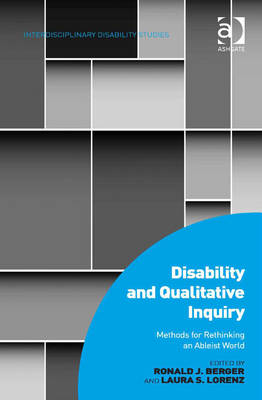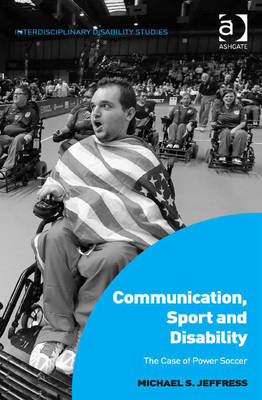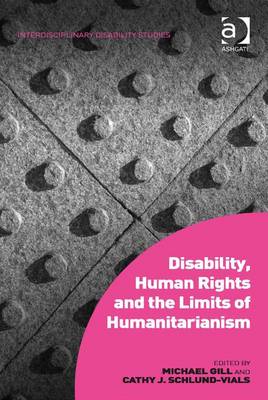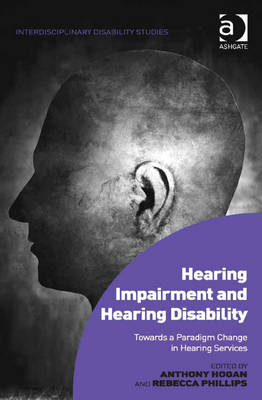Interdisciplinary Disability Studies
4 total works
Disability and Qualitative Inquiry
This groundbreaking text makes an intervention on behalf of disability studies into the broad field of qualitative inquiry. Ronald Berger and Laura Lorenz introduce readers to a range of issues involved in doing qualitative research on disabilities by bringing together a collection of scholarly work that supplements their own contributions and covers a variety of qualitative methods: participant observation, interviewing and interview coding, focus groups, autoethnography, life history, narrative analysis, content analysis, and participatory visual methods.
The chapters are framed in terms of the relevant methodological issues involved in the research, bringing in substantive findings to illustrate the fruits of the methods. In doing so, the book covers a range of physical, sensory, and cognitive impairments.
This work resonates with themes in disability studies such as emancipatory research, which views research as a collaborative effort with research subjects whose lives are enhanced by the process and results of the work. It is a methodological approach that requires researchers to be on guard against exploiting informants for the purpose of professional aggrandizement and to engage in a process of ongoing self-reflection to clear themselves of personal and professional biases that may interfere with their ability to hear and empathize with others.
Sports are ubiquitous in American society, and given their prominence in the culture, it is easy to understand how most youth in the United States face pressure to participate in organized sports. But what does this mean for the hundreds of thousands of Americans who live with one or more physical disabilities and, in particular, those in powered wheelchairs?
Located at the intersection of sports and disability, this book tells the story of power soccer - the first competitive team sport specifically designed for electric wheelchair users. Beginning in France in the 1970s, today, over sixty teams compete within the United States Power Soccer Association (USPSA) and the sport is actively played in over thirty countries.
Using ethnographic research conducted while attending practices, games, and social functions of teams from across the nation, Jeffress builds a strong case that electric wheelchair users deserve more opportunity to play sports. They deserve it because they need the same physical and psychosocial benefits from participation as their peers, who have full use of their arms and legs. It challenges the social constructions and barriers that currently stand in the way. Most importantly, this book tells the story of some amazing power soccer athletes. It is a moving, first-hand account of what power soccer means to them and the implications this has for society.
Disability, Human Rights and the Limits of Humanitarianism
Disability studies scholars and activists have long criticized and critiqued so-termed `charitable' approaches to disability where the capitalization of individual disabled bodies to invoke pity are historically, socially, and politically circumscribed by paternalism. Disabled individuals have long advocated for civil and human rights in various locations throughout the globe, yet contemporary human rights discourses problematically co-opt disabled bodies as `evidence' of harms done under capitalism, war, and other forms of conflict, while humanitarian non-governmental organizations often use disabled bodies to generate resources for their humanitarian projects.
It is the connection between civil rights and human rights, and this concomitant relationship between national and global, which foregrounds this groundbreaking book's contention that disability studies productively challenge such human rights paradigms, which troublingly eschew disability rights in favor of exclusionary humanitarianism. It relocates disability from the margins to the center of academic and activist debates over the vexed relationship between human rights and humanitarianism. These considerations thus productively destabilize able-bodied assumptions that undergird definitions of personhood in civil rights and human rights by highlighting intersections between disability, race, gender ethnicity, and sexuality as a way to interrogate the possibilities (and limitations) of human rights as a politicized regime.
Hearing Impairment and Hearing Disability
The purpose of this book is to challenge people (service providers, people with a hearing disability and those who advocate for them) to reconsider the way western society thinks about hearing disability and the way it seeks to 'include them'. It highlights the concern that the design of hearing services is so historically marinated in ableist culture that service users often do not realise they may be participating in their own oppression within a phono-centric society.
With stigma and marginalisation being the two most critical issues impacting on people with hearing disability, Hogan and Phillips document both the collective and personal impacts of such marginality. In so doing, the book brings forward an argument for a paradigm shift in hearing services. Drawing upon the latest research and policy work, the book opens up a conceptual framework for a new approach to hearing services and looks at the kinds of personal and systemic changes a paradigm shift would entail.



